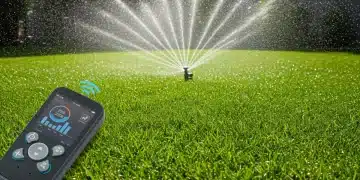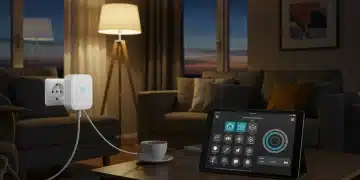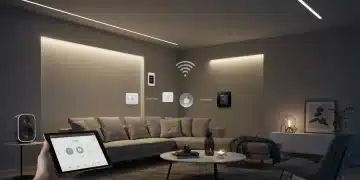Smart Home Water Leak Detectors: Protect Your Home Now
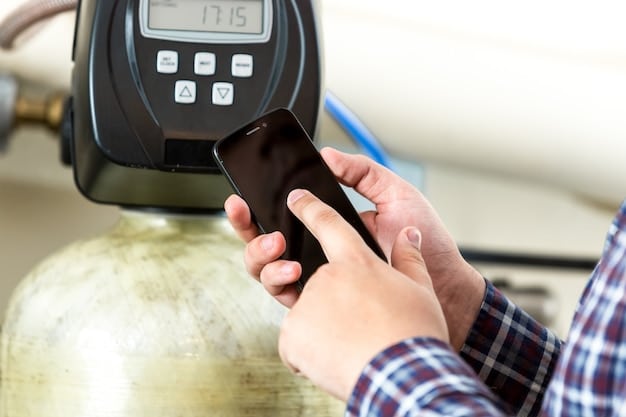
Smart home water leak detectors offer real-time alerts, preventing costly water damage by promptly notifying homeowners of leaks from burst pipes, faulty appliances, or other plumbing issues.
Imagine getting an instant alert on your phone the moment a pipe bursts in your basement, even when you’re miles away. With smart home water leak detectors, this isn’t just a possibility; it’s a reality. These devices are designed to provide real-time warnings, helping you prevent costly water damage and potentially save thousands of dollars.
Why You Need Smart Water Leak Detectors
Water damage is a silent destroyer. It can start small, like a drip under the sink, and quickly escalate into a major problem affecting your home’s structure, electrical systems, and even your health. Smart water leak detectors are an investment in peace of mind, offering constant vigilance against potential disasters.
The High Cost of Water Damage
Water damage isn’t just about replacing a few wet carpets. It often involves extensive repairs to walls, floors, and ceilings. Mold growth, a common consequence of water damage, can lead to health problems and further structural issues. The financial burden can be substantial.
How Smart Detectors Work
These detectors use sensors to detect the presence of water. When water is detected, the device sends an alert to your smartphone or other connected devices. Some detectors also integrate with smart home systems, allowing you to automatically shut off the water supply in case of a leak.
- Early detection minimizes damage.
- Remote alerts keep you informed even when you’re away.
- Integration with smart systems can automate responses.
Smart water leak detectors are like having a 24/7 security guard for your plumbing, providing constant protection against the unexpected. They are a proactive measure that can help you avoid the stress and expense of major water damage repairs.
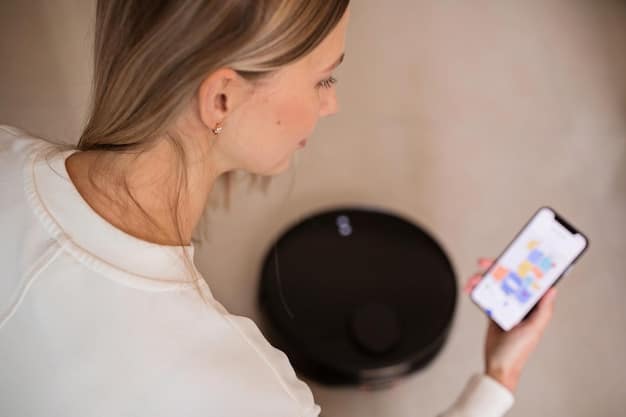
Key Features to Look For in a Water Leak Detector
Choosing the right water leak detector involves considering several factors. Not all detectors are created equal, and understanding the key features will help you make an informed decision that suits your specific needs and protects your home effectively.
Sensitivity and Accuracy
The detector’s sensitivity is crucial. It should be able to detect even small amounts of water quickly and accurately. False alarms can be annoying, but a detector that misses a real leak is worse. Look for devices with adjustable sensitivity settings to fine-tune performance.
Connectivity and Alerts
A reliable Wi-Fi connection is essential for timely alerts. Consider detectors that offer multiple alert methods, such as push notifications, email, and even audible alarms. Battery life is also important, ensuring the detector remains operational during power outages.
Ease of Installation and Use
Most smart water leak detectors are designed for easy installation. They typically require no special tools or plumbing knowledge. Look for user-friendly apps and simple setup processes. The goal is to have a detector that works seamlessly without adding complexity to your life.
- Adjustable sensitivity prevents false alarms.
- Multiple alert methods ensure you don’t miss a warning.
- Simple installation makes setup quick and easy.
By focusing on sensitivity, connectivity, and ease of use, you can find a smart water leak detector that provides reliable protection and integrates seamlessly into your home.
Placement Strategies for Optimal Leak Detection
The effectiveness of a smart water leak detector depends not only on its features but also on where you place it. Strategic placement ensures comprehensive coverage and maximizes the chances of early leak detection, preventing extensive damage.
High-Risk Areas
Focus on areas with a high risk of leaks, such as under sinks, near toilets, water heaters, washing machines, and dishwashers. These are common spots where leaks often originate. Place detectors directly on the floor or near plumbing connections.
Basements and Crawl Spaces
Basements and crawl spaces are vulnerable to water damage from external sources, such as rain or groundwater. Place detectors along the perimeter of these areas and near any potential entry points. Consider using detectors with extension cables to reach hard-to-access spots.
Multi-Story Homes
In multi-story homes, leaks can travel through walls and ceilings, causing damage to multiple floors. Place detectors on each floor, particularly near bathrooms and kitchens. This provides layered protection and helps catch leaks before they spread.
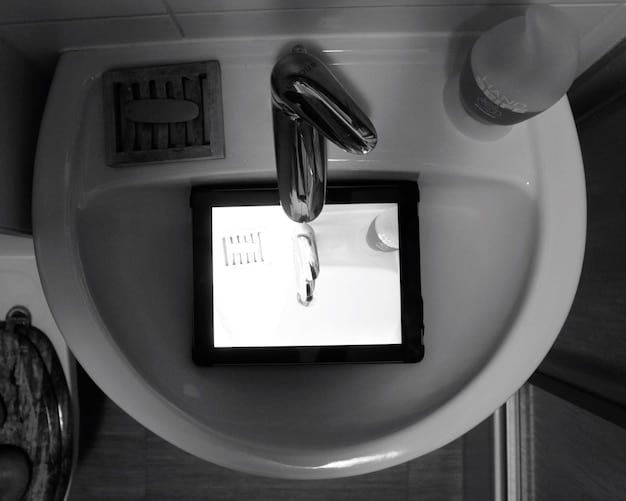
Strategic placement transforms smart water leak detectors from simple gadgets into a comprehensive home protection system. By focusing on high-risk areas, basements, and multi-story coverage, you can significantly reduce the risk of water damage.
Integrating Water Leak Detectors with Smart Home Systems
One of the most compelling aspects of smart water leak detectors is their ability to integrate with other smart home systems. This integration allows for automated responses to detected leaks, enhancing protection and convenience.
Automated Water Shut-Off
Some detectors can be connected to a smart water shut-off valve. When a leak is detected, the valve automatically shuts off the water supply, preventing further damage. This feature is particularly useful when you’re away from home and can’t manually shut off the water.
Home Automation Platforms
Smart water leak detectors can integrate with popular home automation platforms like Amazon Alexa, Google Assistant, and Apple HomeKit. This allows you to receive voice alerts, control the detectors with voice commands, and create custom automation routines.
Benefits of Integration
Integration provides a more holistic approach to home protection. It streamlines alerts, automates responses, and enhances overall convenience. The ability to control and monitor your water leak detectors from a central hub adds to the peace of mind.
Integrating smart water leak detectors with other smart home systems creates a powerful and proactive defense against water damage. The combination of early detection, automated responses, and centralized control makes your home safer and more efficient.
Comparing Popular Smart Water Leak Detector Brands
With numerous brands offering smart water leak detectors, it’s essential to compare their features, performance, and price points. A side-by-side comparison helps you identify the best option for your specific needs and budget.
Brand A: The Budget-Friendly Option
Brand A offers a range of affordable water leak detectors with basic features like water detection and smartphone alerts. These detectors are easy to install and use, making them a great choice for first-time users or budget-conscious homeowners. However, they may lack advanced features like automated shut-off or integration with all smart home platforms.
Brand B: The Feature-Rich Choice
Brand B’s detectors boast advanced features such as automated water shut-off, integration with multiple smart home platforms, and adjustable sensitivity settings. These detectors offer comprehensive protection and customizable settings. They come at a higher price point, but the added features may be worth the investment for homeowners seeking premium protection.
Brand C: The Professional-Grade Solution
Brand C offers professional-grade water leak detectors designed for large homes or commercial properties. These detectors feature robust construction, long-range connectivity, and advanced analytics. They are ideal for homeowners who demand the highest level of protection and are willing to invest in a premium solution.
- Brand A: Affordable and easy to use.
- Brand B: Feature-rich with automated shut-off.
- Brand C: Professional-grade with advanced analytics.
By comparing these brands, it’s clear that there’s a smart water leak detector for every need and budget. Consider your specific requirements and priorities when choosing the right brand and model for your home.
Installation and Maintenance Tips for Long-Term Reliability
To ensure your smart water leak detectors provide reliable protection for years to come, proper installation and regular maintenance are crucial. These steps help maximize the performance and longevity of your devices.
Correct Placement
Ensure detectors are placed in the correct locations, as discussed earlier. Use adhesive strips or mounting brackets to secure them in place. Avoid placing them in areas where they might be accidentally bumped or moved.
Regular Testing
Test your detectors regularly to ensure they are functioning correctly. Most detectors have a test button that simulates a leak. Check that you receive an alert on your smartphone or other connected devices. Testing should be done at least once a month.
Battery Replacement
Replace batteries as needed. Most detectors have a low-battery indicator. Use high-quality batteries to ensure reliable performance. Consider detectors with long-lasting batteries to minimize replacement frequency.
Following these installation and maintenance tips will help ensure your smart water leak detectors provide long-term reliability and protect your home from water damage for years to come. Remember, a well-maintained detector is a dependable one.
| Key Point | Brief Description |
|---|---|
| 💧 Early Detection | Minimizes water damage and repair costs. |
| 📱 Remote Alerts | Provides notifications to your smartphone, even when you’re away. |
| 🛠️ Easy Installation | Simple setup with no special tools required. |
| 🏠 Smart Integration | Connects with smart home systems for automated responses. |
[Frequently Asked Questions]
What are the most common causes of water leaks in a home?
Most water leaks are due to burst pipes, leaky appliances (like washing machines and dishwashers), damaged roofs, or overflowing toilets. Old, corroded pipes are also a frequent culprit.
What should I do if a water leak detector alerts me to a leak?
First, shut off the main water supply to your home to minimize damage. Then, identify the source of the leak and contact a professional plumber or repair service to fix the issue promptly.
How often should I test my water leak detectors?
It’s best to test your water leak detectors at least once a month to ensure they’re working correctly. Simply press the test button on the device and verify you receive a notification on your smartphone.
Can water leak detectors help lower my insurance premiums?
Some insurance companies offer discounts for homes equipped with smart water leak detectors, as they can significantly reduce the risk of costly water damage claims. Check with your insurance provider to see if you qualify.
Where are the best places to install water leak detectors in my home?
Install detectors in high-risk areas like under sinks, near toilets, water heaters, washing machines, and dishwashers. Basements and crawl spaces are also key locations for leak detection.
What are the most common causes of water leaks in a home?
Most water leaks are due to burst pipes, leaky appliances (like washing machines and dishwashers), damaged roofs, or overflowing toilets. Old, corroded pipes are also a frequent culprit.
What should I do if a water leak detector alerts me to a leak?
First, shut off the main water supply to your home to minimize damage. Then, identify the source of the leak and contact a professional plumber or repair service to fix the issue promptly.
How often should I test my water leak detectors?
It’s best to test your water leak detectors at least once a month to ensure they’re working correctly. Simply press the test button on the device and verify you receive a notification on your smartphone.
Can water leak detectors help lower my insurance premiums?
Some insurance companies offer discounts for homes equipped with smart water leak detectors, as they can significantly reduce the risk of costly water damage claims. Check with your insurance provider to see if you qualify.
Where are the best places to install water leak detectors in my home?
Install detectors in high-risk areas like under sinks, near toilets, water heaters, washing machines, and dishwashers. Basements and crawl spaces are also key locations for leak detection.
Conclusion
Investing in smart home water leak detectors is a proactive step towards safeguarding your home from potentially devastating water damage. With real-time alerts, easy installation, and potential integration with other smart home systems, these devices offer peace of mind and can save you significant amounts of money and stress. By understanding the features, placement strategies, and maintenance tips, you can ensure your home remains protected for years to come.


